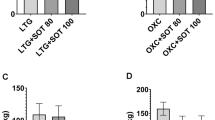Abstract
Rationale: It has been hypothesized that low-affinity, uncompetitive N-methyl-d-aspartate (NMDA) antagonists may have therapeutic efficacy (e.g., in epilepsy, stroke, drug dependence) without the adverse side effects associated with high-affinity ligands (e.g., dizocilpine, phencyclidine). Objectives: To determine whether low-affinity NMDA antagonists have a larger predicted therapeutic window than high-affinity ligands. Methods: In Swiss-Webster mice, we compared the effects of uncompetitive antagonists having a range of affinities for the NMDA receptor ion channel [dizocilpine, memantine, ibogaine, amantadine and 5-aminocarbonyl-10,11-dihydro-5h-dibenzo[a,d] cyclohepten-5,10-imine (ADCI)] in three behavioral assays typically used to assess NMDA receptor antagonism. Behavioral side effects were compared with the efficacy of the compounds to protect against NMDA-induced seizures. Results: Only dizocilpine and memantine substituted fully in mice trained to discriminate dizocilpine from saline. Dizocilpine (K i ∼0.003 µM) protected against NMDA-induced convulsions at doses that produced ataxia and stimulation of locomotor activity. Conversely, memantine (K i ∼0.54 µM) prevented convulsions at doses that were 8- to 18-fold lower than those producing ataxia or effects on locomotion, respectively. Indeed, in contrast to dizocilpine, memantine did not stimulate locomotor activity but only produced dose-dependent reductions. The low-affinity antagonists ibogaine (K i ∼1 µM) and ADCI (K i ∼11 µM) protected against convulsions at doses that produced significant dizocilpine-like discriminative stimulus effects, ataxia and decreases in locomotor activity. Amantadine (K i ∼11 µM) was ineffective against NMDA-induced convulsions up to doses that produced significant behavioral side effects. Conclusions: These findings indicate that only certain low-affinity, uncompetitive NMDA antagonists (e.g., memantine) may have therapeutic efficacy at doses that do not produce an adverse side-effect profile. For other therapeutic endpoints, different estimates of efficacy and safety require derivation.
Similar content being viewed by others
Author information
Authors and Affiliations
Additional information
Received: 12 January 1999 / Final version: 7 May 1999
Rights and permissions
About this article
Cite this article
Geter-Douglass, B., Witkin, J. Behavioral effects and anticonvulsant efficacies of low-affinity, uncompetitive NMDA antagonists in mice. Psychopharmacology 146, 280–289 (1999). https://doi.org/10.1007/s002130051118
Issue Date:
DOI: https://doi.org/10.1007/s002130051118




